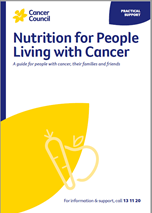Feeling sick
People with advanced cancer often have problems with feeling sick (nausea) or being sick (vomiting). These can be caused by treatment with chemotherapy or radiation therapy, cancer growth, blockage in the bowel or the location of the cancer. Nausea can usually be managed with medicines.
Learn more about some things you can do to manage nausea and vomiting.
Learn more about:
- Anticipatory nausea
- Blockage in the bowel
- High levels of calcium in the blood
- Increased pressure in the brain
- Tips for when you’re feeling sick
Anticipatory nausea
Many people talk about anticipatory nausea, the response your body learns when you know it is chemotherapy time again. Even if you are no longer having chemotherapy, you may still feel a surge of nausea if you are reminded about chemotherapy – for example, if you go past the place where you were treated or eat a food you ate during that time.
Blockage in the bowel
Sometimes cancer in the abdominal area or near the bowel can cause the bowel to become blocked. This is called bowel obstruction.
Because waste matter (faeces or poo) cannot pass through the bowel easily, symptoms may include feeling sick or vomiting. To relieve these symptoms, you may have a small, hollow tube (stent) put in that helps keep the bowel open. The stent is inserted through the rectum using a flexible tube called an endoscope.
If you have any symptoms that you may have a possible bowel obstruction, seek medical help urgently, don’t wait for it to get better.
High levels of calcium in the blood
Feeling nauseous may be a symptom of high levels of calcium in your blood (hypercalcaemia).
If the cancer spreads to the bones, the cancer cells make the bone break down and release calcium into the blood. This can cause you to feel tired, thirsty and confused. Hypercalcaemia is more common in some types of advanced cancer. Drinking more water can sometimes help.
You may also be given drugs to lower your calcium levels. These are called bisphosphonates, which are usually given through a drip into a vein.
Increased pressure in the brain
Cancer in the brain can also be a cause of nausea. You will usually be given steroids to reduce swelling around the tumour.
Tips for when you’re feeling sick
- Eat small meals or have some snacks 5–6 times throughout the day. While you might not feel like eating, going without food for long periods can make nausea worse.
- Choose cold foods or foods at room temperature, such as sandwiches, salads, stewed fruit or jelly.
- Have some foods or drinks that contain ginger, such as ginger ale, ginger tea or ginger biscuits.
- Take any anti-nausea medicines as prescribed. Let the doctor know if the medicines don’t seem to be working as there may be other options you could try.
- Avoid fried, greasy or spicy foods or those that have strong smells.
- Try to reduce stress with meditation. Cancer Council has relaxation and meditation recordings in the Finding Calm During Cancer podcast series.
During treatment I developed an active sense of smell. I hated certain smells and did all I could to avoid them. My mouth felt very dry, which made food taste unappetising. Adding extra sauce helped.
Helen
Podcast: Appetite Loss and Nausea
Listen to more episodes from our podcast for people affected by cancer
More resources
Dr Lucy Gately, Medical Oncologist, Alfred Health and Walter and Eliza Institute for Medical Research, VIC; Dr Katherine Allsopp, Supportive and Palliative Care Specialist, Westmead Hospital, NSW; A/Prof Megan Best, The University of Notre Dame Australia and The University of Sydney, NSW; Dr Keiron Bradley, Palliative Care Consultant, Medical Director Palliative Care Program, Bethesda Health Care, WA; Craig Brewer, Consumer; Emeritus Professor Phyllis Butow, Psychologist, The University of Sydney and Chris O’Brien Lifehouse, NSW; Louise Durham, Palliative Care Nurse Practitioner Outpatients, Princess Alexandra Hospital, Metro South Palliative Care, QLD; Dr Roya Merie, Radiation Oncologist, ICON Cancer Centre, Concord, NSW; Penny Neller, Project Coordinator, National Palliative Care Projects, Australian Centre for Health Law Research, Queensland University of Technology, QLD; Caitriona Nienaber, 13 11 20 Consultant, Cancer Council WA; Xanthe Sansome, Program Director, Advance Care Planning Australia, VIC; Sparke Helmore Lawyers; Peter Spolc, Consumer.
View the Cancer Council NSW editorial policy.
View all publications or call 13 11 20 for free printed copies.

